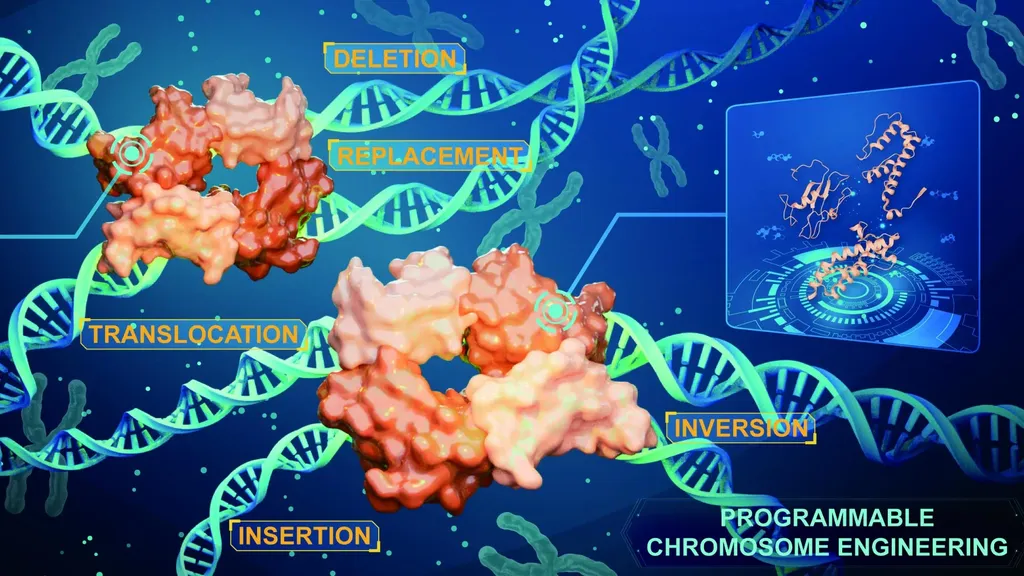In a groundbreaking development for the agricultural and horticultural sectors, researchers have unveiled the haplotype-resolved genome assembly of the hexaploid kiwifruit, Actinidia deliciosa. This achievement, led by Xiaolong Li from the National Key Laboratory for Development and Use of Forest Food Resources at Zhejiang A&F University in China, sheds new light on the hybrid origin and polysomic inheritance of this commercially vital fruit. Published in *Plant Communications* (which translates to “Plant Communications” in English), the study promises to revolutionize our understanding of kiwifruit genetics and could pave the way for significant advancements in breeding programs and commercial cultivation.
The hexaploid nature of kiwifruit, meaning it has six sets of chromosomes, has long posed a challenge for geneticists. “Unraveling the complex genome of kiwifruit is like solving a intricate puzzle,” Li explained. “Each piece represents a haplotype, and putting them together accurately is crucial for understanding the fruit’s genetic makeup and inheritance patterns.” By resolving these haplotypes, the research team has provided a comprehensive genetic map that reveals the fruit’s hybrid origins and provides insights into its polysomic inheritance, where multiple sets of chromosomes interact during reproduction.
This research is not just an academic feat; it has profound implications for the commercial kiwifruit industry. Kiwifruit is a major export crop for countries like New Zealand, Italy, and China, with a global market value exceeding billions of dollars. The genetic insights gained from this study can be leveraged to develop more robust and productive kiwifruit varieties. “Understanding the genetic basis of important traits, such as disease resistance and fruit quality, will enable breeders to create varieties that are not only more resilient but also meet consumer preferences,” Li noted.
The study also highlights the importance of genetic diversity in crop plants. By elucidating the hybrid origin of kiwifruit, researchers can better understand how genetic diversity contributes to the fruit’s adaptability and resilience. This knowledge can be applied to other crops, enhancing their ability to withstand environmental stresses and pests, which is crucial in an era of climate change.
The implications of this research extend beyond kiwifruit. The methodologies and insights gained from this study can be applied to other polyploid crops, which are plants with multiple sets of chromosomes. Polyploidy is common in many commercially important plants, including wheat, potatoes, and strawberries. By understanding the genetic complexities of these crops, researchers can develop strategies to improve their yield, quality, and sustainability.
The publication of this research in *Plant Communications* underscores its significance within the scientific community. The journal is known for its rigorous peer-review process and high standards, ensuring that the findings are both reliable and impactful. This study is a testament to the power of modern genomic technologies and collaborative research efforts.
As the agricultural industry continues to evolve, the need for innovative solutions to enhance crop productivity and sustainability becomes increasingly urgent. The haplotype-resolved genome assembly of kiwifruit represents a significant step forward in this endeavor. By providing a detailed genetic map, this research opens new avenues for breeding programs, genetic engineering, and crop improvement strategies. It also highlights the importance of investing in genetic research to address the challenges faced by the agricultural sector.
In the words of Xiaolong Li, “This research is just the beginning. The genetic insights we have gained will not only benefit kiwifruit cultivation but also pave the way for advancements in other crops. It’s an exciting time for agricultural science, and we are eager to see how these findings will shape the future of farming.”
As the global population continues to grow, the demand for food will increase, making it essential to develop more efficient and sustainable agricultural practices. The haplotype-resolved genome assembly of kiwifruit is a crucial piece of the puzzle in achieving this goal. By harnessing the power of genetic research, we can create a more resilient and productive agricultural system that meets the needs of future generations.

